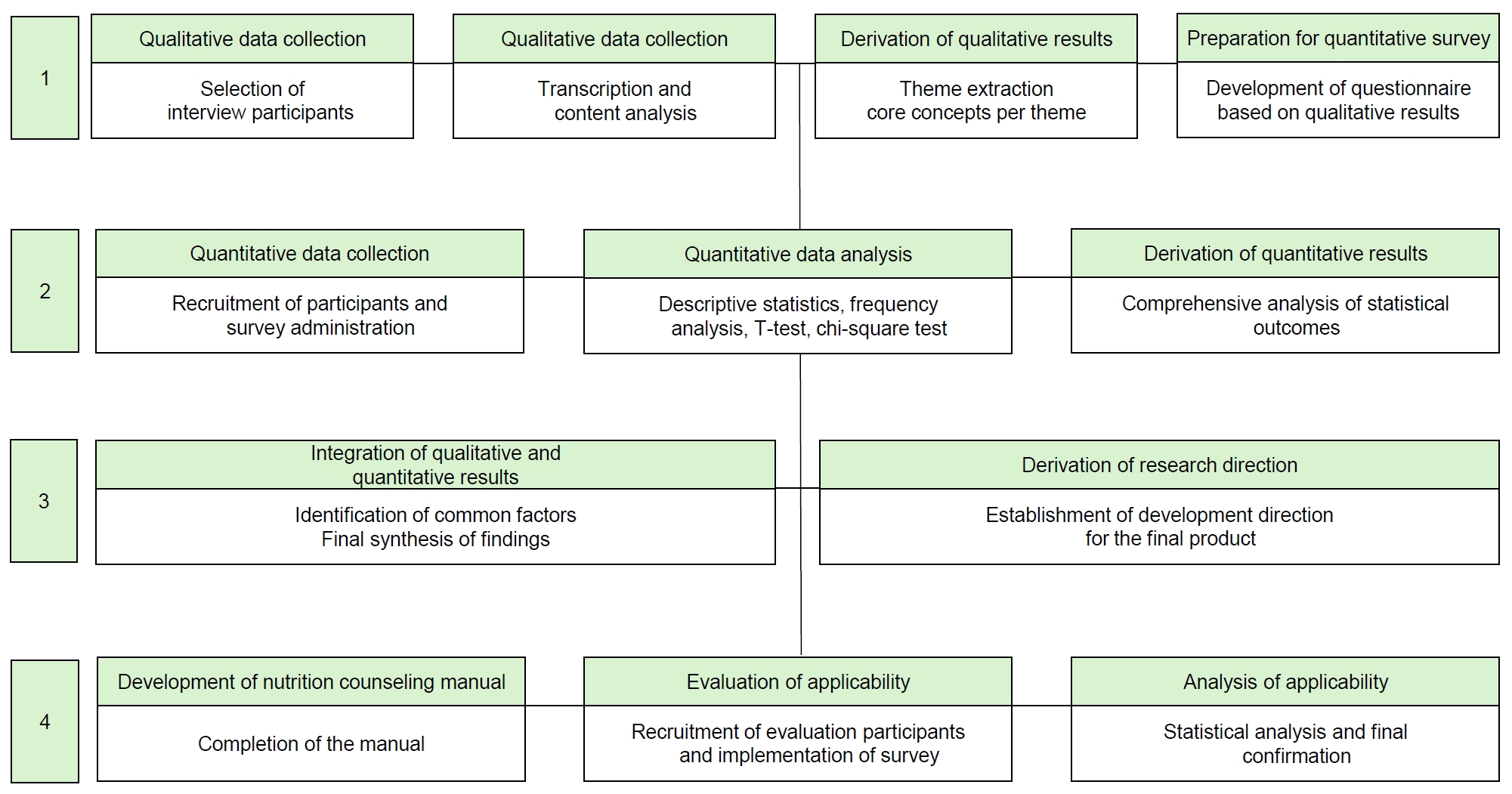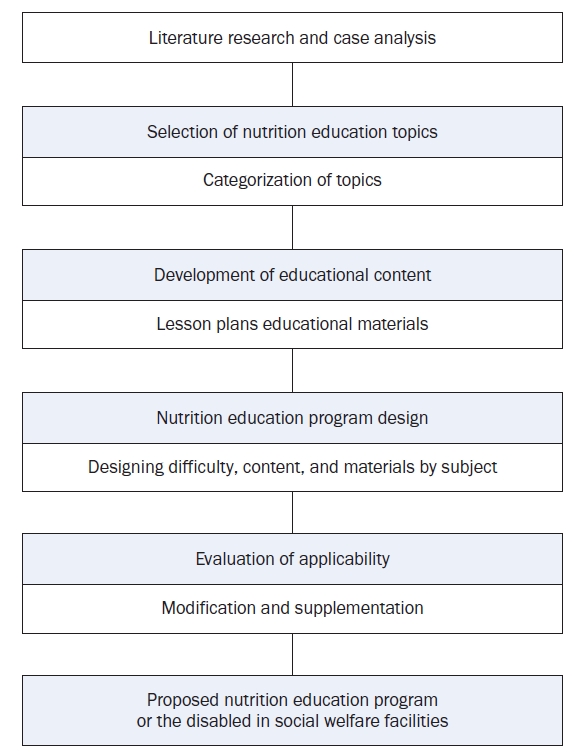Search
- Page Path
- HOME > Search
Research Articles
- [Korean]
- A study on the development of nutrition counseling manual and curriculum for the disabled in Korea: a mixed-methods study
- Kyoung-Min Lee, Woo-jeong Kim, So-young Kim, Young-mi Park, Hwa-young Yoon, Min-Sun Jeon
- Korean J Community Nutr 2025;30(5):376-388. Published online October 31, 2025
- DOI: https://doi.org/10.5720/kjcn.2025.00192

-
 Abstract
Abstract
 PDF
PDF - Objectives
Individuals with disabilities require targeted interventions to ameliorate disability-related conditions and improve overall health status. Nutritional challenges and counseling needs vary according to the type of disability, necessitating comprehensive assessments of dietary habits, physical activity, and food intake. Compared to traditional education, nutrition counseling offers a more sustainable and environmentally adaptable approach that effectively addresses individualized nutritional issues. Therefore, this study aimed to develop and evaluate a practical nutrition counseling manual and meal guidelines for people with disabilities in Korea, addressing their diverse dietary needs and improving nutritional care in social welfare facilities.
Methods
A four-stage integrated research design was employed. Stage 1 involved qualitative research through in-depth interviews with 11 facility staff. In Stage 2, a nationwide survey (n = 249) was conducted based on the results of the interviews. Stage 3 integrated both qualitative and quantitative findings. Stage 4 focused on developing and evaluating a nutrition counseling manual and five types of meal guidelines through feedback from 26 nutritionists at 24 Korean Centers for Social Welfare Foodservice Management.
Results
Six major nutrition counseling topics were identified: healthy eating, managing salt and sugar intake, dysphagia diet, appropriate intake, and hygiene. The manual and guidelines demonstrated high field usability, with average satisfaction scores of 3.98 and 3.99, respectively.
Conclusion
The integrated study resulted in the development of a specialized nutrition counseling manual and handbook for individuals with disabilities in Korean social welfare facilities. The materials were revised and improved based on practical evaluations by dietitians, enhancing their field applicability. These tools are expected to contribute to better dietary management and health promotion among facility residents. The developed materials reflect the real-world needs of people with disabilities and offer practical tools for effective nutrition counseling and dietary management in institutional settings.
- 429 View
- 19 Download

- [Korean]
- Development and applicability evaluation of a nutrition education program for residents and users of disability social welfare facilities in Korea: a mixed-methods study
- Jin-kyung Kim, Kyoung-min Lee, Min-sun Jeon
- Korean J Community Nutr 2025;30(1):64-74. Published online February 28, 2025
- DOI: https://doi.org/10.5720/kjcn.2025.00017

-
 Abstract
Abstract
 PDF
PDF - Objectives
This study aimed to develop a nutrition education program based on social cognitive theory to promote the health of individuals using facilities for people with disabilities. It also sought to evaluate the applicability of the educational materials through assessments by counselors at the Social Welfare Food Service Management Support Center.
Methods
A group of six experts developed the program based on a needs assessment of nutrition education in facilities for individuals with disabilities. Applicability was evaluated through an online survey of 26 counselors from Social Welfare Food Service Management Support Centers nationwide in July 2023, and the results were analyzed.
Results
The nutrition education program includes a basic course on personal hygiene, dining etiquette, picky eating prevention, and obesity management. The advanced course covers dietary management for chronic diseases, such as meal planning for hypertension, diabetes management, and dietary principles for dysphagia. Additionally, lecture PPTs, individual activity sheets, and experiential teaching aids were developed. Applicability evaluations showed high scores, with the teaching-learning plan and PPT averaging 4.15 and the experiential teaching aids scoring 4.17, all above 4.0.
Conclusion
This study developed a nutrition education program for individuals with disabilities and assessed its applicability and usability. Implementing this program in disability welfare institutions could enhance health promotion and improve the quality of life for individuals with disabilities. -
Citations
Citations to this article as recorded by- Development of a standard nutrition management model algorithm for personalized care in social welfare facilities for the disabled
Su-Jin Lee, Ji-Won Kang, Sil Ah Kim, Kirang Kim, Sohyun Park, Jieun Oh, Hyunjoo Ryou, Ji-Yun Hwang
Journal of Nutrition and Health.2025; 58(5): 498. CrossRef
- Development of a standard nutrition management model algorithm for personalized care in social welfare facilities for the disabled
- 2,704 View
- 78 Download
- 1 Crossref


 KSCN
KSCN

 First
First Prev
Prev



